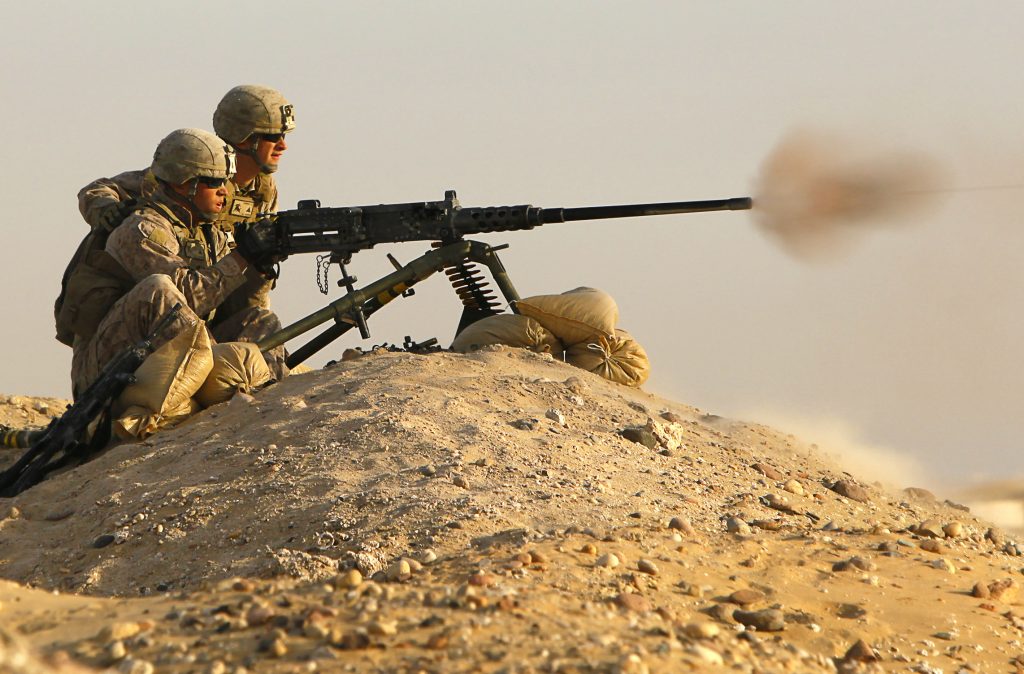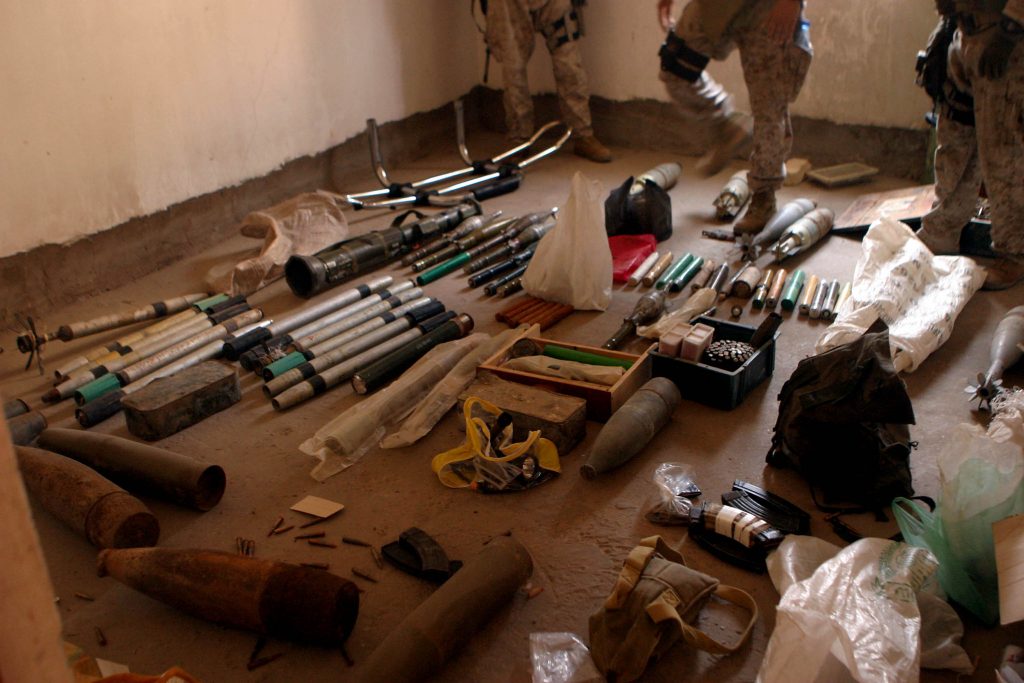Amnesty International: U.S. military failed to monitor over $1 billion arms transfers to Iraq, Kuwait
A recent Department of Defense report suggests that the U.S. military did a poor job in keeping track of military equipment sent to Iraq and Kuwait. Amnesty International says this is just one illustration of how leakage of US arms ended up supporting local fighting groups.
The DOD audit had to determine whether the U.S. army had effective controls for processing and transferring Iraq Train and Equip Fund equipment to the Government of Iraq and it was the third in a series of audits dealing with property accountability for Operation Inherent Resolve.
Lost in the shuffle

The findings of the audit, made public, were sobering. It pointed out that the army’s 1st Theater Sustainment Command, charged with maintaining visibility and property accountability of ITEF equipment until being transferred to the Government of Iraq, did not have effective control over the properties.
“The 1st TSC could not provide complete data for the quantity and dollar value of equipment on hand, including rolling stock and ammunition,” the audit findings point out.
The report further revealed that there was no centralised system of keeping track of the equipment, instead, the army relied on spreadsheets developed by different commands in both Kuwait and Iraq to provide it with visibility
and accountability. In conclusion, there was no up-to-date information on the whereabouts and the numbers of some of the U.S. properties.
While some of the equipment referred to rolling stock such as Mine Clearance Systems, ambulances, and wrecker trucks, it also included weapons and ammunition.
And this is exactly what Amnesty International has drawn attention to in a recently released statement.
Weaponizing both sides

Amnesty International’s Arms Control and Human Rights Researcher highlights that not keeping strict records when it comes to military equipment leads to serious consequences.
“This audit provides a worrying insight into the US Army’s flawed, and potentially dangerous system for controlling millions of dollars’ worth of arms transfers to a hugely volatile region,” said Patrick Wilcken, Amnesty International’s Arms Control and Human Rights Researcher.
The ITEF was a crucial part of the U.S.- Iraqi security cooperation and in 2015, the US Congress appropriated $1.6 billion for the program to combat the advance of ISIS.
Congress agreed to supply not only helmets, binoculars, improved first aid kits and body armour, necessary for the Iraqi forces but also tens of thousands of guns like M4 carbines, sniper rifles, and M3 Carl Gustaf man-portable reusable anti-tank recoilless rifles, to name a few.
In total, $28 million worth of weapons were to be sent to the central Iraqi Army, including the predominantly Shi’a Popular Mobilization Units, as well as the Kurdish Peshmerga forces, together with hundreds of mortar rounds and armoured Humvee vehicles.
The equipment was supposed to be used in the fight against ISIS. But Amnesty argues that the audit shows how fragmented record keeping can result in leakage of arms which can then make their way into the hands of groups that use them to commit atrocities.
This could well be the case for ISIS, the group that these weapons are supposed to help fight against.
“It makes for especially sobering reading given the long history of leakage of US arms to multiple armed groups committing atrocities in Iraq, including the armed group calling itself the Islamic State,” Wilcken.
Ghost from the past

The recent audit concludes by saying that the Armed Forces should implement an automated system that allows for total transparency and accountability but Amnesty argues that it could be a long way to go until such measures are put into place.
Amnesty points out that this was not the first time that audits showed lax rules and regulations when it came to keeping records. A DoD audit two years ago uncovered even more dangerous procedures. According to Amnesty, there were instances in which the Iraqi army itself had no knowledge of what it had in its warehouses.
Meanwhile, other military equipment, which had never been opened or inventoried, was stored out in the open, in shipping containers.
“The need for post-delivery checks is vital. Any fragilities along the transfer chain greatly increase the risks of weapons going astray in a region where armed groups have wrought havoc and caused immense human suffering,” said Patrick Wilcken.
In response to the audit, the US military has pledged to tighten up its systems for tracking and monitoring future transfers to Iraq.
But Amnesty specialists remain skeptical as they cite another such response, given to Congress as far back as 2007.
It’s a risky behaviour, experts from AI say, and it is not a viable counter-terrorism strategy to keep pouring in money into weapons and ammunition that could end up in the wrong hands.
“After all this time and all these warnings, the same problems keep re-occurring. This should be an urgent wake-up call for the US, and all countries supplying arms to Iraq, to urgently shore up checks and controls. Sending millions of dollars’ worth of arms into a black hole and hoping for the best is not a viable counter-terrorism strategy; it is just reckless,” said Patrick Wilcken.
Amnesty International is urging the USA to comply with the Leahy Law, which prohibits the supply of most types of US military aid and training to foreign security, military and police units credibly alleged to have committed “gross human rights violations”.
The watchdog is also asking for the US to adhere to the global Arms Trade Treaty, which has strict rules in place to stop arms transfers or diversion of arms that could fuel atrocities.
These steps, they argue, could prevent weapons made in the U.S. and other countries from reaching paramilitary groups or other armed militias that carry out war crimes and other atrocities.
Accidents, corruption and betrayal

But incomplete records are not the only perils when it comes to cutting off armament supply to combatants. A New York Times article back in 2014 highlighted how weapons sent to Iraq could be subverted by paramilitary groups within the Iraqi army, and make their way into the hands of Islamic State combatants.
The article revealed corruption within the Iraqi army and much-needed steps to stop the haemorrhage of weapons.
A year later, a 44-page Amnesty report documented that ISIS fighters were also using U.S. made weapons and ammunition, taken from Iraqi forces and Syrian combatants.
The same year, the Telegraph reported that Pentagon-trained rebels in Syria have betrayed their American backers and handed their weapons over to al-Qaeda in Syria immediately after re-entering the country.
A Twitter post from the fraction leader that got the weapons thanked the rebels for the “very large amount of ammunition and medium weaponry and a number of pick-ups.”
In late 2016, the State Department had to respond to a new article in the New York Times, which argued that CIA-supplied weapons ended up on the black market while al-Qaeda released a video showing its own stockpile of U.S. fabricated arms and ammunition.